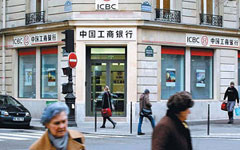Liberalization journey
China's push to internationalize its currency started in 2008, when the global financial crisis demonstrated the danger of over-reliance on the US dollar.
|
 |
|
 |
Beijing soon began to encourage the use of its currency in international trade and swap arrangements among central banks and bank deposits and bond issuances in Hong Kong.
Trade in offshore renminbi has since boomed. Increasing Chinese exports also led to a surge in demand for renminbi outside China as Chinese exporters increasingly expect to be paid in their own currency to eliminate exchange risks.
"For a country that's predicted to become the largest economy in the world, it's only logical that the currency also goes global. Renminbi internationalization is a big theme, but it is really about China opening up," says Rongrong Huo, head of renminbi business development at HSBC Europe.
"Many Western countries have increasingly realized they want to engage with China. Offshore renminbi activities are a good way to start that engagement," she says.
Following Hong Kong's success in growing offshore renminbi products and services, other international centers including London, Paris, Frankfurt, Luxembourg and New York all entered the race to become a Western center for offshore renminbi.
One area of significant development seen over the last few years is the trend by European companies of switching to renminbi invoicing when trading with their Chinese partners, to avoid exchange risks and to receive better margins.
London, for example launched an initiative in April 2012 to make renminbi trade processing easier for European businesses and offered companies and investors the opportunity to trade, invest and bank in renminbi in London.
Led by the City of London Corp and involving efforts from 13 Chinese and Western banks, the initiative achieved considerable progress. Trade finance transactions using the Chinese currency totaled 27.94 billion yuan in the first half of 2013, up from 13.8 billion yuan a year earlier.
"The confidence among clients in utilizing and trading in renminbi has increased probably 200 percent since we started this initiative. So we've seen clients actually wanting to trade in renminbi and invoice in renminbi," says Sonia Rossetti, managing director of Europe and head of product management at Standard Chartered Plc.
